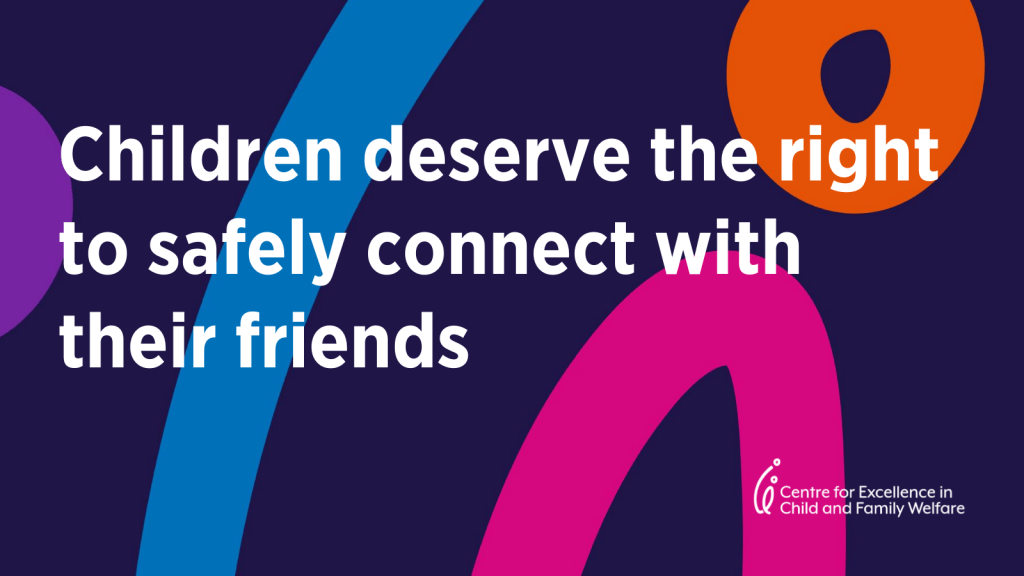By Deb Tsorbaris, CEO Centre for Excellence in Child and Family Welfare
Anyone who has walked past a recently re-opened Melbourne playground or school will have noticed the happiness in children’s faces as they can finally meet and play with other children.
The importance of play is recognised in the United Nations Convention on the Rights of the Child, which establishes the right to play and recreation as a human right for children and young people. We know that play builds confidence in children, helps them to feel loved, happy and safe, develops essential social skills, language and communication, helps children learn about caring for others and the natural environment and improves physical skills.
Making, maintaining and navigating friendships is a crucial part of childhood. For adolescents, friendships and the peer group take centre stage in the progression to independence. For many children and adolescents this vital social interaction is taking place online, and this trend has only increased as we navigate school and childcare closures in response to COVID-19.
A study by UNICEF looking at how Australian young people have responded to the pandemic found that 45% were concerned about maintaining their connection to friends. Social media and the online environment have been a way for children and young people to maintain these vital connections with friends and family in lockdown.
Online platforms provide avenues for young people to join groups or make connections with other like- minded people with similar interests outside of the usual social networks of family, school and the local community. For many young people it provides a ticket to the wider world.
However, there is a darker side. A recent report by Plan International has found that one in five of the 1000 Australian girls and young women surveyed had feared for their physical safety due to online threats. A recent review of Interpol members’ data bases has found an increase in the sharing of child sexual exploitation and abusive material through peer-to-peer networks and a significant increase in exploitative and abusive material on social media platforms and messaging applications.
Excessive use of screens has been increasingly linked to poorer outcomes for children and young people, including for mental health. Even prior to the restrictions imposed by the pandemic, Victorian children and young people were reporting increasing mental health concerns and this has continued during the pandemic. The annual State of Victoria’s Children report has found that many adolescents are overweight and most do not meet guidelines for diet, exercise or screen time.
The pandemic has also highlighted the inequities that already exist for children and young people in accessing online technologies. Many children have struggled to access the necessary technology and devices to complete remote schooling, and access mental health and other services, let alone to maintain these crucial social connections.
As a society we need to actively support children, young people and their families to safely navigate the digital world. Clear information about the benefits and risks of the online environment is key, not just for parents but also for children and young people themselves. This way we can retain the positives that have come out of the move to online engagement during the pandemic whilst protecting against the negatives.
As we enter the post-COVID-19 recovery phase we need to listen to children and young people about what they need to be able to reconnect with their friends. As a community we have recognised the importance of good mental health and wellbeing during the periods of lockdown and this needs to continue well into next year. This will involve providing children and young people with the opportunity to safely consolidate disrupted friendships, make new social connections and most importantly to play – in our schools, homes, parks and playgrounds – but also online.
Children’s Week 2020 will be held between 24 October and 1 November 2020.
Deb Tsorbaris is the CEO of the Centre for Excellence in Child and Family Welfare, the peak body for child and family services in Victoria representing over 100 community service organisations, students and individuals. The Centre advocates for the rights of children and young people to be heard, to be safe, to access education and to remain connected to family, community and culture. Our vision is to see a community that is fair, equitable and creates opportunities for children and their families live happy and healthy lives.
Media contact: Christie Long, 0403 053 584 or [email protected]






